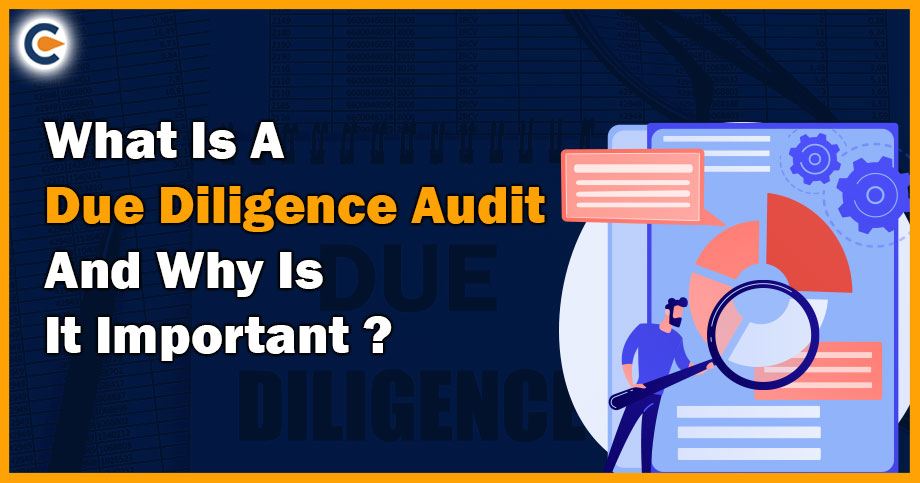Financial Due Diligence is a comprehensive analysis of a company’s financial situation, performed by a potential buyer, investor, or lender, to determine its current financial health and future growth potential. The purpose of this is to identify any financial, operational, or strategic risks associated with the transaction, and to provide a clear understanding of the financial and economic aspects of the company being evaluated.
It plays a crucial role in business transactions, such as mergers and acquisitions, private equity investments, and corporate finance transactions. The results of financial due diligence provide valuable information to the parties involved in the transaction, enabling them to make informed decisions, negotiate favourable terms, and minimize risks. It is typically performed by third-party professionals with expertise in finance, accounting, and business operations.
Financial Due Diligence is important for businesses and investors because it helps them to assess the true financial and operational value of the company being evaluated. This information is crucial for making informed decisions about whether to invest in, acquire, or lend money to the company. It also helps to identify any hidden financial or operational risks, such as outdated technology, underperforming assets, or undisclosed liabilities, which could negatively impact the financial health of the company in the future. Ultimately, Financial Due Diligence helps businesses and investors to minimize their risks and maximize their potential returns.
Key Components of Financial Due Diligence
Following are some important components of Financial Due Diligence:
A. Explanation of the Key Areas Covered By Financial Due Diligence:
Financial Due Diligence covers a comprehensive range of key areas, including financial statements analysis, market research, operational analysis, legal and regulatory compliance, and tax implications. Some of the key areas that are typically evaluated include the company’s revenue and profitability, cash flow and liquidity, debt and financing structure, and overall financial performance. In addition, the company’s management team, competitive landscape, and market conditions are also evaluated to provide a comprehensive understanding of the business and its future growth prospects.
B. Overview of Financial Statements Analysis and Market Research:
Financial statements analysis is one of the most important components of Financial Due Diligence. This involves a detailed review of the company’s financial records, including its balance sheet, income statement, and cash flow statement, to determine its financial stability and performance. Market research is another important component of Financial Due Diligence that involves gathering information about the company’s target market, competition, and trends. This information is used to evaluate the company’s growth potential and to determine the risks associated with its future prospects.
C. Discussion on the Importance of Assessing Financial Risks and Tax Implications:
Assessing financial risks and tax implications is a critical component of Financial Due Diligence. This involves identifying any potential financial risks that could impact the company’s future performance, such as market risks[1], liquidity risks, and credit risks. It also involves evaluating the company’s tax implications, including its tax liability, tax planning strategies, and any tax disputes that could impact its financial health. This information is crucial for making informed decisions about the company’s financial stability and its potential for future growth. Additionally, the assessment of financial risks and tax implications helps to minimize the risks associated with the transaction and ensures that the parties involved are fully aware of the financial and tax implications of the proposed transaction.
Benefits of Conducting Financial Due Diligence
Following are the benefits of conducting Financial Due Diligence:
A. Explanation of How Financial Due Diligence Helps Minimize Risks:
1. Identifies potential financial, operational, and strategic risks associated with the transaction.
2. Provides a comprehensive understanding of the financial and economic aspects of the company being evaluated.
3. Helps to uncover any hidden financial or operational risks, such as outdated technology, underperforming assets, or undisclosed liabilities.
4. Enables the parties involved to make informed decisions and negotiate favourable terms.
B. Discussion on How Financial Due Diligence Leads to Informed Investment Decisions:
1. Provides valuable information to support investment decisions.
2. Helps investors to assess the true financial and operational value of the company being evaluated.
3. Identifies any potential red flags that could impact the company’s future performance.
4. Supports informed decision-making by providing a comprehensive understanding of the company’s financial health, growth potential, and risks.
C. Overview of the Impact of Financial Due Diligence on Business Growth and Success:
1. Supports the growth and success of the business by enabling informed investment decisions.
2. Helps to minimize the risks associated with the transaction and ensures long-term financial stability.
3. Enables businesses to assess the financial health of potential acquisition targets and identify any areas for improvement.
4. Supports the growth and success of the business by providing a comprehensive understanding of the company’s financial and operational performance and potential.
Common Challenges Faced During Financial Due Diligence
Following are some challenges faced during Financial Due Diligence:
- Overview Of The Common Challenges Faced During Financial Due Diligence:
It is a complex process that involves gathering and analyzing a large amount of financial and operational data. Common challenges faced during Financial Due Diligence include limited access to information, lack of transparency, and the difficulty in evaluating complex financial systems and processes. In addition, there may be issues with data quality and integrity, including outdated or incomplete financial information, which can make it difficult to get an accurate picture of the company’s financial health. Additionally, the time and resource constraints associated with this can also pose a challenge.
- Discussion On How To Overcome These Challenges:
To overcome these challenges, it is important to have a well-structured and organized approach to Financial Due Diligence. This involves developing a clear plan, with defined goals and objectives, and ensuring that the right resources and tools are in place to support the process. In addition, having access to experienced and knowledgeable professionals, such as financial analysts, accountants, and lawyers, can help to minimize the risks and ensure a thorough and accurate evaluation of the company.
- Importance Of Having A Professional And Experienced Team For Financial Due Diligence:
Having a professional and experienced team is critical to the success of Financial Due Diligence. This is because the team must have the necessary skills, knowledge, and expertise to thoroughly evaluate the financial and operational aspects of the company being evaluated. In addition, the team must have strong analytical skills, be able to work efficiently and effectively and be able to identify and address any potential risks or issues that may arise during the due diligence process. By having a professional and experienced team in place, businesses and investors can minimize the risks associated with the transaction and make informed decisions about the company’s financial health and future growth prospects.
Conclusion
The future outlook for Financial Due Diligence in the business world is positive, with an increasing demand for comprehensive and efficient due diligence processes. As the business world becomes increasingly complex, with a growing number of transactions and investments, the need for reliable and accurate information will continue to grow. In response, it is likely to continue to evolve and incorporate new technologies and tools to improve efficiency and accuracy. Additionally, the increasing importance of sustainability and ESG considerations will likely play a larger role in the future of Financial Due Diligence, as investors and businesses seek to understand the potential impact of these factors on the long-term financial performance of companies. In conclusion, it is an important tool for businesses and investors to assess the financial health and potential of a company before making an investment decision. It helps to minimize risks and support informed investment decisions, leading to long-term business success.
Read Our Article: Financial Due Diligence: A Complete Checklist











